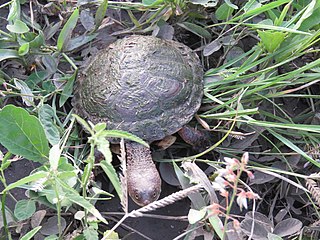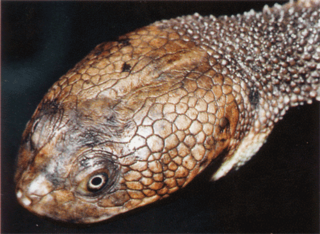
Heosemys is a genus of freshwater turtles in the family Geoemydidae. The genus Heosemys was split out of the related genus Geoemyda by McDowell in 1964.

The eastern long-necked turtle is an east Australian species of snake-necked turtle that inhabits a wide variety of water bodies and is an opportunistic feeder. It is a side-necked turtle (Pleurodira), meaning that it bends its head sideways into its shell rather than pulling it directly back.

Chelodina, collectively known as snake-necked turtles, is a large and diverse genus of long-necked chelid turtles with a complicated nomenclatural history. Although in the past, Macrochelodina and Macrodiremys have been considered separate genera and prior to that all the same, they are now considered subgenera of the Chelodina, further Macrochelodina and Macrodiremys are now known to apply to the same species, hence Chelydera is used for the northern snake-necked turtles.

Nilssonia is a genus of softshell turtles from rivers, streams, ponds, and lakes in South Asia and Burma. In many treatments, it is monotypic, with the single species Burmese peacock softshell. However, the supposed other genus of peacock softshells, Aspideretes, is more closely related to N. formosa than had been believed. They differ only in the neural plates between the first pleural scale pair of the bony carapace, which are fused into one in N. formosa and unfused in the others.

The Chaco side-necked turtle is a species of turtle in the family Chelidae. It is found in Argentina, Paraguay, and possibly Bolivia. Its natural habitat is subtropical or tropical moist montane forests. The turtle possesses long horny spurs on its upper thighs. It is 18 cm in shell length. Like other members of its genus, the turtle buries itself in the mud when the streams run dry, a behaviour possibly parallel to the winter hibernating behaviours of turtles further north.

The Brazilian radiolated swamp turtle is a species of turtle in the Chelidae family endemic to Brazil.

The black spine-neck swamp turtle, also commonly known as the spiny-neck turtle or Spix's sideneck turtle, is a species of turtle in the family Chelidae. The species is endemic to South America, specially in the Southern Cone region.

The New Guinea snake-necked turtle is a species of turtle in the family Chelidae. The species is found almost exclusively within Western Province, Papua New Guinea.

The oblong turtle, also known commonly as the narrow-breasted snake-necked turtle and the southwestern snake-necked turtle, is a species of turtle in the family Chelidae. The species is endemic to the southwestern part of Western Australia.

Parker's snake-necked turtle is a species of turtle in the family Chelidae.
Pritchard's snake-necked turtle is a species of turtles in the family Chelidae. The species is endemic to a restricted area of Central Province, Papua New Guinea.
Reimann's snake-necked turtle is a species of turtle in the family Chelidae. The species is endemic to Oceania and Southeast Asia.

Elseya is a genus of large side-necked turtles, commonly known as Australian snapping turtles, in the family Chelidae. Species in the genus Elseya are found in river systems in northern and northeastern Australia and throughout the river systems of New Guinea. They are identified by the presence of alveolar ridges on the triturating surfaces of the mouth and the presence of a complex bridge strut.

The Western New Guinea stream turtle or New Guinea snapping turtle is a species of freshwater turtle in the Chelidae family. It is found in the Bird's Head Peninsula and the Bomberai Peninsula west of Cenderawasih Bay, and on the island of Waigeo of West Papua, Indonesia.

Chelodina canni, also known commonly as Cann's snake-necked turtle, is a species of turtle in the family Chelidae. The species is endemic to Australia, where it is found in the northern and northeastern parts of the continent. It has a narrow zone of hybridization with its related species the eastern snake-necked turtle, C. longicollis. For many years C. canni was assumed to be the same species as C. novaeguineae from New Guinea. However, in 2002 it was shown that these two species differ both morphologically and genetically, and therefore C. canni was separated and described as a unique species.

Elseya dentata, the northern snapping turtle, is a large aquatic turtle found throughout many rivers in northern Western Australia and the Northern Territory. It is one of three species in the nominate subgenus Elseya.

Chelodina (Chelydera) burrungandjii, the sandstone snake-necked turtle or Arnhem Land long-necked turtle, is a medium-sized turtle reaching carapace lengths of 316 mm. The species is found in the sandstone plateaus and escarpments and the plunge pools of Arnhem Land of the Northern Territory. The species had been long recognised as valid. However, it had been difficult to research due to the remoteness of its habitat. Efforts to breed this species in captivity had been largely unsuccessful, until National Aquarium Herpetologist Matthew Benedict lead a successful breeding project in 2021. The species occurs in proximity to Chelodina rugosa, to which it is closely related. For the most part the two species are parapatric in distribution. However, they do come together in limited locations such as plunge pools at the base of the escarpments. In these areas there is hybridization between the species.

Emydura macquarii is a species of turtle in the family Chelidae. It is a wide-ranging species that occurs throughout many of the rivers of the eastern half of Australia. It is found primarily in the Macquarie River basin and all its major tributaries, along with a number of coastal rivers up the New South Wales Coast. It is also found in the coastal Queensland rivers and the Cooper Creek ecosystem, along with Fraser Island.

Elseya schultzei, commonly known as Schultze's snapping turtle, is a species of chelid turtle endemic to northern New Guinea.
Chelodina gunaleni, also known commonly as Gunalen's long-necked turtle and Gunalen's snake-necked turtle, is a species of turtle in the family Chelidae. The species is endemic to the lowlands of west-central West Papua, Indonesia, south of the central ranges.

















